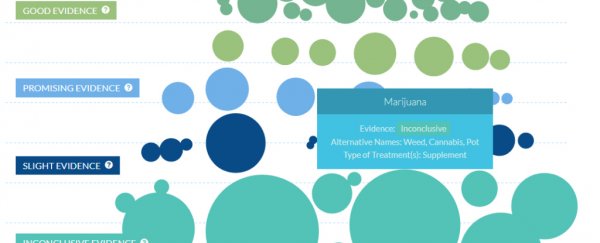Cancer is one of the scariest health diagnoses anyone could face, and there's a lot of information floating around about how to treat it. Now a new infographic aims to help you separate the good from the dangerous.
Some of what's out there is prescribed and recommended by professionals. Some is folk medicine, recommended by anecdote, or quackery. You might think there's no harm in trying some remedies out, just in case. Sometimes that's true, but other times it could be actively dangerous, or may interfere with prescribed treatments.
Finding accurate information online can be so difficult. Which is why a team of researchers has now created an interactive website that tells you the effectiveness of more than 100 cancer treatments, remedies, supplements, and clinical trials - based on peer-reviewed scientific research.
"We wanted to create a comprehensive and authoritative resource to help people sort through the vast amounts of information (and, unfortunately, misinformation) and options regarding cancer treatment and remedies," Domenica D'Ottavio of Mesothelioma Treatment Centers, a legal organisation for helping victims of asbestos in the US, told ScienceAlert.
You can see a preview of their results below, and the full interactive version is available for anyone to access for free.

The interactive guide took a team of researchers and data journalists over six months to collate, using academic research search engine Google Scholar to find research papers, determine how well discussed they are, and gauge the promise of the results.
All of this information is presented in a handy, interactive infographic, with treatments listed down the page based on whether they have strong, good, slight, inconclusive, or no evidence for their efficacy against cancer.
The bigger the bubble, the more papers there are available on the treatment in Google Scholar. (They even compared Scholar results to those found through Google News to assess differences in data.) You can also filter by the type of trials that have been done on a treatment.
When you hover your mouse over a bubble (or simply tap on mobile), it provides information on the treatment and details on clinical trials - whether a treatment has undergone clinical trials and, if it has, if they were on humans or other animals. Information that's extremely important to have on hand if you're making a life or death decision.
Worryingly, just 1.7 percent of the remedies the team looked at had strong evidence for efficacy, while a massive 34.5 percent showed no evidence.
They also found that more than 1 in 10 supplement-based treatments were harmful to the patient.
Among the treatments that have 'strong evidence' behind them are immunotherapy, aromatase inhibitor therapy, surgery, and chemotherapy.

Popular supplements and remedies such as vitamin C, selenium, and acai berries had no evidence to support the idea that they could treat cancer. Marijuana and green tea both had inconclusive evidence behind them.

And remedies such as amygdalin, found in apricot kernel extract, can actually be harmful - a recent case study showed a patient getting cyanide poisoning from using apricot kernel extract to prevent a relapse of his prostate cancer.
 Mesothelioma Treatment Centers
Mesothelioma Treatment Centers
The new site is more important now than ever before. Especially when you consider the fact that this is what comes up as the top result when you google 'cancer remedies'.
 Screenshot by ScienceAlert
Screenshot by ScienceAlert
While studies showing positive results of new treatments are well represented on Google Scholar, they are much harder to find through a regular online search.
So it's likely that cancer patients and their loved ones searching for information would have a hard time finding information on, for example, external beam radiation therapy, which has achieved strong results.
"Our biggest hope is that this can help people who are researching treatments that they or their loved ones may be considering," D'Ottavio said.
Explore the full interactive map of cancer treatments and remedies on the Mesothelioma Treatment Centers web page.
